Posts Tagged ‘Mediterranean Regional Centre for Traditional Chinese Medicine in Malta’
-
Repairing the house before it rains
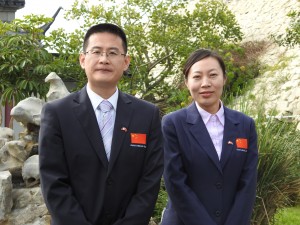 “In China we have this concept to repair the house before it rains. We give great attention to our health and well-being because certainly prevention is always better than cure,” declares Dr Xiaoming Yang, a traditional Chinese medicine physician which is presently giving his services at the Mediterranean Regional Centre for Traditional Chinese Medicine in Kordin, Paola.
“In China we have this concept to repair the house before it rains. We give great attention to our health and well-being because certainly prevention is always better than cure,” declares Dr Xiaoming Yang, a traditional Chinese medicine physician which is presently giving his services at the Mediterranean Regional Centre for Traditional Chinese Medicine in Kordin, Paola.This Centre was established in 1994 as part of a project of cooperation between Malta and China. From then on, every two years, a new Chinese medical team was sent to Malta to replace the previous group in order to continue their duty at this Centre and at clinics in Mater Dei hospital and the general hospital in Gozo. This time, due to new arrangements, this group of Chinese doctors will only stay in Malta for one year until a new group comes to take over.
“Each time, the best Chinese doctors are chosen to come over to Malta since this country is regarded as a very important hub from which to introduce traditional Chinese medicine to other countries as well. Malta’s strategic location makes it ideal to act as a significant connection between Asia, Europe and Africa.”
“Nowadays more and more people are pursuing a healthy lifestyle, and they search for ways in how to keep fit, how to prevent disease and how to prolong life. The key to all these questions is to return to nature because we are part of nature. Nature provides us with all the necessities which are indispensable for our survival. The concept of unity between man and nature is the most basic principle on which this traditional Chinese medicine was founded.”
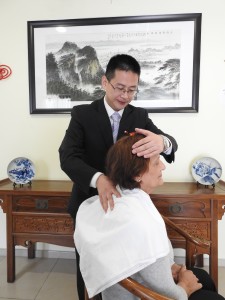 Through his experience at this Centre, Dr Yang noticed that in general Maltese patients, especially the senior population, complain from arthritis, insomnia, frozen shoulder and neck and lower back pain.
Through his experience at this Centre, Dr Yang noticed that in general Maltese patients, especially the senior population, complain from arthritis, insomnia, frozen shoulder and neck and lower back pain.“It is difficult to find a common factor to all these afflictions because many of the patients have different circumstances. However, I did notice some habits and way of life which may lead to these dicomforts, pains and illnesses.”
“In contrast to China, few Maltese people tend to do regular check-ups. Many of them go to the doctor only when they feel pain or some other disturbance. In China, hospitals send out reminders to people to attend to regular tests and many of them comply. This helps the doctor to identify any health problems at an early stage.”
“Another custom in Malta is to attend gyms, often irregularly, without proper supervision or any sensible preparation. Exercising too hard or too long, and training without suitable warming up will eventually lead to health problems. In China, people use traditional martial arts to train the mind, body and soul by doing slow but effective movements which give rise to no strain.”
“Over-exertion is another issue. Although in China I heard that the Maltese enjoy a siesta in the afternoon, in reality I found out that most people have more than one job, starting very early in the morning and continuing late at night. Such long work hours will inevitably lead to over-exertion which will then generate fatigue, strained muscles or disease. Being always so busy makes it also difficult to attend to the required amount of treatments. In fact, while in China, my patients come to my clinic to get treatment around three to five times a week, in Malta, a patient will call to have therapy only once a week or once a month. In my country, people are given permission to leave work in order to have treatment because if a worker is in pain, he may make mistakes. Taking leave to attend therapy does not seem to be as easy in Malta.”
Since regular therapy is essential to heal faster, Dr Yang dedicates himself to teach his Maltese patients how to do self-treatment exercises.
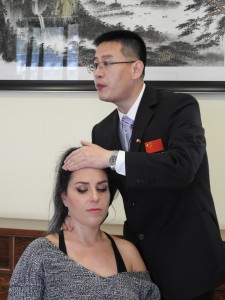 “I have trained Maltese people to make tuina manipulation by themselves generally to treat headache, migraine, neck pain or spinal pain. Knowledge of tuina manipulation involves the pressing of particular acupoints to help release discomfort or pain. This helps to increase the curative effect of my therapy at the Centre.”
“I have trained Maltese people to make tuina manipulation by themselves generally to treat headache, migraine, neck pain or spinal pain. Knowledge of tuina manipulation involves the pressing of particular acupoints to help release discomfort or pain. This helps to increase the curative effect of my therapy at the Centre.”“Tuina manipulation includes the use of hand and arm techniques to massage the muscles and tendons of the body, the stimulation of acupressure points to directly affect the flow of Qi energy through the system of channels and collaterals, and manipulation techniques to realign the musculo-skeletal and bone setting.”
Other services offered at the Centre are acupuncture, cupping, ear acupressure, and moxibustion.
“Traditional Chinese medicine is different from Western medicine since it looks at the body as a whole and does not focus just on the inflicted area. When a patient comes to me, I take time to question him about several factors in his life. I look at his appearance, his tongue, his walk. I ask about his appetite and whether he is suffering from insomnia. Then I continue to search for the root of the problem by touching various acupoints in order to identify where the real trouble is. Sometimes a patient might tell me that he is suffering from a headache but then I realize that the problem is in his neck or that it actually is psychological stress.”
During a recent open day held at the Centre with the theme A Journey into Traditional Chinese Medicine, Dr Yang explained about the different treatments which are being offered at the Centre. He also announced that in March, he would be training Maltese people in traditional Chinese martial arts.
“The intent of traditional Chinese martial arts is to relax and exercise the body in a gentle way by absorbing the energy from the surrounding nature and improving the Qi (energy in the body). For several centuries, these martial arts have helped people to obtain and enjoy a state of good health and well-being.”
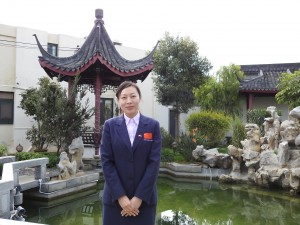 Ms Wei Han, the Chinese interpreter at the Centre provided interesting information about the use of herbs to improve health and well-being.
Ms Wei Han, the Chinese interpreter at the Centre provided interesting information about the use of herbs to improve health and well-being.“Being with these doctors I learnt a lot about traditional Chinese medicine and herbs. In the past, when our ancestors were sick, they went back to nature to find answers in how to regain their health. Through experience and experiments they found the right herbs and they used them as natural medicine to treat illnesses and more important to prevent disease and to maintain health. They also found that certain foods can also be used to treat illness. Some herbs can be used both as food and for medicinal therapy. Ginger for example is often used as spice to give flavour to other foods and obviously it is food. But it can also be used as a herb with medicinal values – it helps us to warm our stomach, to improve digestion and to control nausea.”
As a taster to the participants, the Centre’s chef prepared mutton soup with angelica and ginger, and Chinese berry tea with lily bulbs and red dates.
“We are glad to invite at our Centre all those who are interested to know more about traditional Chinese medicine, traditional Chinese martial arts and traditional Chinese philosophy. Visitors can also enjoy our traditional Chinese garden which though small, it incorporates all the typical philosophical ideas and most important elements. Stones in the garden represent the body of the world, like hills and valleys. Water is the spirit of the world providing oxygen, like blood running through the veins. The pavilion is always located at the best point where one can watch the sunset and the sunrise, and meditate about life or simply relax and have a rest. Our patients find this garden optimal to calm down and to escape from the outside world where pain ceases to exist, at least for a short time,” concluded Ms Han.
For more information, one can contact the Mediterranean Regional Centre for Traditional Chinese Medicine on 2169 1799.
(This feature was published in The Times of Malta in 2018)
-
Free weekly acupuncture treatments in Gozo
Since 1994, several Chinese medical teams have been offering medical treatments to the Maltese public from the Mediterranean Regional Centre for Traditional Chinese Medicine in Kordin. This professional service extends also at Mater Dei Hospital and at Gozo General Hospital.
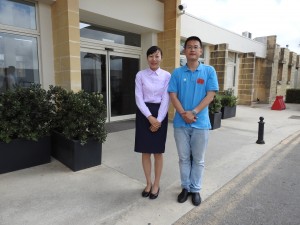 I accompanied Dr Xiao Ming Yang and Ms Wei Han on their weekly visit to Gozo General Hospital.
I accompanied Dr Xiao Ming Yang and Ms Wei Han on their weekly visit to Gozo General Hospital.“Every Wednesday afternoon, I treat an average of 24 patients with acupuncture. Many of the patients book the treatment at the hospital, however I do not mind treating also those individuals who happen to come by,” explained Dr Yang.
Dr Yang and Ms Han’s dedication to their work is impeccable. They take the responsibility to carry with them all the required material from Malta to Gozo. From time to time, they also provide the patients with bonus treatments to take home with them.
“Acupuncture treatments are provided free of charge according to an agreement which was done between the Maltese and the Chinese governments. This is a way of showing the mutual respect which exists between the two countries.”
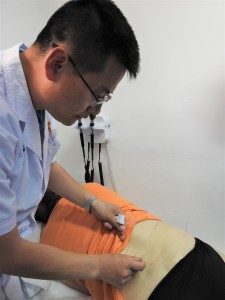 Around 30 patients were waiting for Dr Yang at Gozo General Hospital. The relationship between the Chinese doctor and his Gozitan patients was clearly amicable as he went round each patient and applied the required acupuncture treatment.
Around 30 patients were waiting for Dr Yang at Gozo General Hospital. The relationship between the Chinese doctor and his Gozitan patients was clearly amicable as he went round each patient and applied the required acupuncture treatment.The popularity of this treatment is definitely pushing for more adequate space in order to provide this service to all those who need it. For a more effective benefit of this Chinese traditional therapy, several patients have also expressed their wish to increase the frequency of the doctor’s visit to at least twice a week.
After the acupuncture treatment, Ms Han, the Chinese interpreter at the Centre, prepared five different herbal teasfor those who attended. She also shared interesting information about the benefits of these teas.
“Chinese herbal teas have been used for centuries to provide healthy refreshment. Drinking herbal teas is a natural and effective way to gain various health benefits. Each tea can have one ingredient or many with different benefits,” revealed Ms Han.
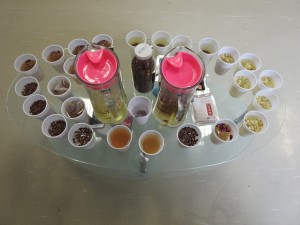 “Jasmine tea is one of the most popular flower teas among foreigners because of its pleasant scent and taste. In ancient times in China, this tea was mainly reserved for royalty since it has so many health benefits. The high level of antioxidants in the tea help to boost the body metabolism making exercise more effective. This may result in weight loss and in improvement in the digestive process. Moreover, for those with cardiovascular problems, jasmine tea can be a huge help as it aids to lower cholesterol levels and high blood pressure, thereby reducing the risk of heart attacks and maintaining a healthy cardiovascular system. This tea is also ideal for people suffering from chronic discomfort, such as back pain, joint pain and arthritis, because it has anti-inflammatory properties which can help reduce swelling and inflammation of joints.”
“Jasmine tea is one of the most popular flower teas among foreigners because of its pleasant scent and taste. In ancient times in China, this tea was mainly reserved for royalty since it has so many health benefits. The high level of antioxidants in the tea help to boost the body metabolism making exercise more effective. This may result in weight loss and in improvement in the digestive process. Moreover, for those with cardiovascular problems, jasmine tea can be a huge help as it aids to lower cholesterol levels and high blood pressure, thereby reducing the risk of heart attacks and maintaining a healthy cardiovascular system. This tea is also ideal for people suffering from chronic discomfort, such as back pain, joint pain and arthritis, because it has anti-inflammatory properties which can help reduce swelling and inflammation of joints.”“Rose tea is used to relieve menstrual discomfort or heavy period. It can also regulate the sleep cycle and pattern. For those who suffer from insomnia or have disturbed sleep, drinking rose tea before going to bed might be a great option. Rose tea can also improve digestion, detoxify the body, and relieve respiratory infections.”
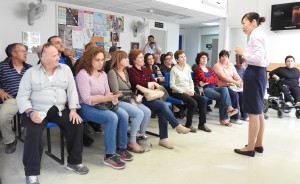 “Buckwheat tea is a kind of grain tea and it can reduce blood glucose and cholesterol. It really has significant cardiovascular benefits and helps to lose weight.”
“Buckwheat tea is a kind of grain tea and it can reduce blood glucose and cholesterol. It really has significant cardiovascular benefits and helps to lose weight.”“Rhodiola tea is made of dry flowers, leaves and roots of a wild plant called Rhodiola Rosea, which grows best in the high, cold mountains, such as Tibet, Siberia and Arctic areas.It has good effects on anti-aging and longevity.In ancient times, Chinese emperors used to send expeditions to remote areasin search of this golden root to make pills of immortality. This tea can also protect human cells especially skin cells from aging, so a lot of beauty products use it as one of their ingredients.”
“Jujube is a kind of sour date. Thanks to its special healing properties relating to insomnia, it is regarded as the “Oriental sleeping fruit.”Jujube seed tea can calm the mind and smooth the nerves. Therefore, it is often used to treat insomnia, nightmares, night sweats, restless sleep and neurasthenia.”
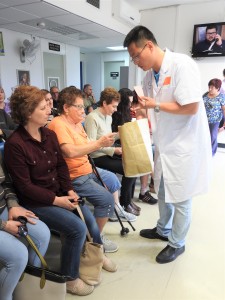 At the end of this meeting, participants were also provided with a packet of tiger balm, green oil and plasters. Tiger balm has been in use in China from the 1870s and it serves to relieve back pain, joint pain, stiffness, sprains, arthritis, headaches, sinus congestion, and discomfort from mosquito bites. Green oil has the same effect as tiger balm. Plasters are mainly used to relieve back pains, joint pains, arthritis, chronic sprain, and rheumatism.
At the end of this meeting, participants were also provided with a packet of tiger balm, green oil and plasters. Tiger balm has been in use in China from the 1870s and it serves to relieve back pain, joint pain, stiffness, sprains, arthritis, headaches, sinus congestion, and discomfort from mosquito bites. Green oil has the same effect as tiger balm. Plasters are mainly used to relieve back pains, joint pains, arthritis, chronic sprain, and rheumatism.For more information, one can contact the Mediterranean Regional Centre for Traditional Chinese Medicine in Kordin on 2169 1799 or the Gozo General Hospital on 2210 6000.
(This article was published in The Malta Independent on Sunday on 5 June 2018)
-
Ancient practices to relieve modern issues
The Mediterranean Regional Centre for Traditional Chinese Medicine in Kordin, Paola offers a variety of services which aim to improve health and wellbeing. Based on Chinese medical practices which date to more than 2000 years of knowledge, the Centre is run by a team of Chinese doctors who promote an alternative medicine which is well beyond what conventional medicine is about. Besides providing medical treatments, the Centre acts also as a source of information for those who would like to learn more about these ancient practices.
On Sunday, 25 March 2018, a series of three lectures which were organized at the Centre introduced the participants to the themes of neck problem therapies, moxibustion treatments, and the perimenopausal syndrome.
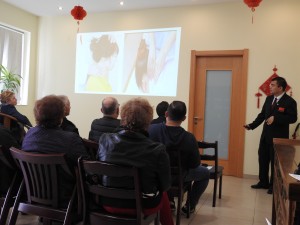 Dr Lu discussed the widespread problem of neck pain and showed some exercises which one can use to avert or to alleviate neck pain.
Dr Lu discussed the widespread problem of neck pain and showed some exercises which one can use to avert or to alleviate neck pain.“Neck pain does not only affect the neck area but it can also lead to several discomforts along other parts of the body. Nowadays many people tend to spend long hours in incorrect postures while looking down at mobiles, sitting at office desks while working on a computer, and watching tv in bed or on a sofa. These are some of the common traits which lead to muscle stress and pain. It only takes little to avoid these mistakes: mobiles should be read at eye level, office chairs should allow workers to sit straight and look comfortably at the computer, tv should not be watched while lying down, and an appropriate pillow should support the spine at the right curve to allow the neck to relax. Ideally, one should change posture regularly to relieve or avoid muscle soreness.”
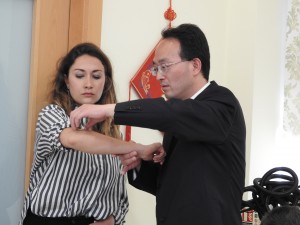 Dr. Zhang explained the benefits of moxibustion treatments and demonstrated how these are applied to patients.
Dr. Zhang explained the benefits of moxibustion treatments and demonstrated how these are applied to patients.“Moxibustion is a traditional Chinese medicine therapy which consists of burning dried mugwort leaf, also known as moxa, to bring relief from pain to the patient. This leaf has a pleasant fragrance and is easy to ignite. Moxibustion is safe and easy to operate. It is also non toxic and has no adverse reactions. However, it should only be done at a professional clinic since there is a risk of getting burnt if not handled properly. Doctors apply moxa to warm meridian points along the body in order to stimulate blood circulation.”
Dr Ma talked about women’s health care and focused on the perimenopausal syndrome which affects a wide section of the female population from the age of 45 to 55. She indicated some exercises which help to relieve stress and also improve memory.
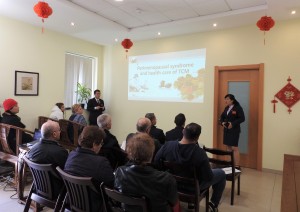 “Perimenopause refers to the time when the body makes the transition to menopause, thereby marking the end of the reproductive years. At this point, women may undergo various symptoms which can make their life stressful and difficult. Sudden hot flashes, insomnia, vaginal dryness and discomfort during love-making, headaches, forgetfulness and emotional instability are some of the main occurrences. Although this change is a natural process, ideally the outcome of menopause should not take place abruptly since this might seriously disturb a woman’s life and also the lives of all those around her. By living a healthy life, eating properly, doing exercise and keeping positive, a woman may help herself to allow a smoother transition which will lead to lesser repercussions. After all, life is what you make it.”
“Perimenopause refers to the time when the body makes the transition to menopause, thereby marking the end of the reproductive years. At this point, women may undergo various symptoms which can make their life stressful and difficult. Sudden hot flashes, insomnia, vaginal dryness and discomfort during love-making, headaches, forgetfulness and emotional instability are some of the main occurrences. Although this change is a natural process, ideally the outcome of menopause should not take place abruptly since this might seriously disturb a woman’s life and also the lives of all those around her. By living a healthy life, eating properly, doing exercise and keeping positive, a woman may help herself to allow a smoother transition which will lead to lesser repercussions. After all, life is what you make it.”More information about the Mediterranean Regional Centre for Traditional Chinese Medicine and its services is available on Facebook or by calling on 2169 1799.
(This feature was published in The Times of Malta on 1st April 2018)
Travelogue
Archives
| M | T | W | T | F | S | S |
|---|---|---|---|---|---|---|
| « Jan | ||||||
| 1 | 2 | 3 | 4 | 5 | 6 | 7 |
| 8 | 9 | 10 | 11 | 12 | 13 | 14 |
| 15 | 16 | 17 | 18 | 19 | 20 | 21 |
| 22 | 23 | 24 | 25 | 26 | 27 | 28 |
| 29 | 30 | |||||
Recent Posts
- A MATTER OF FATE
- MALTA’S PREHISTORIC TREASURES
- THE MAGIC IS IN THE DETAIL
- THE SELLING GAME
- NEVER FORGOTTEN
- Ġrajjiet mhux mitmuma – 35 sena mit-Traġedja tal-Patrol Boat C23
- AN UNEXPECTED VISIT
- THE SISTERS OF THE CRIB
Comments
- Pauline Harkins on Novella – Li kieku stajt!
- admin on IL-KARNIVAL TRAĠIKU TAL-1823
- Albert on IL-KARNIVAL TRAĠIKU TAL-1823
- Martin Ratcliffe on Love in the time of war
- admin on 24 SENA ILU: IT-TRAĠEDJA TAL-PATROL BOAT C23